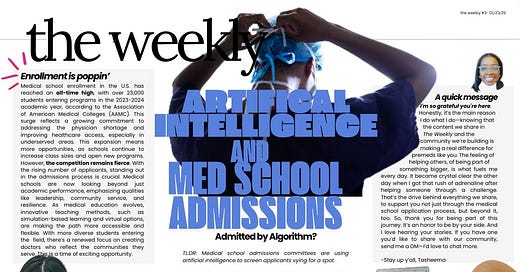We’re covering how AI has finally made it’s way to your medical school admissions application — plus, the latests enrollment numbers, superior study habits, and more.
Want to sponsor this baby? Click the Message PreMedLife button at the bottom of this page.
Announcements….
🗓️ Upcoming Event: Breaking Barriers: Debunking the Top 10 Premed Myths and How to Overcome Them. Join Hugo Mora-Torres a seasoned expert with over 20 years of experience in academic advising and a passion for empowering diverse students to achieve their medical dreams. Hugo will tackle the top 10 myths that often hold premed students back and provide clear, actionable strategies to overcome them.
🗓️ Upcoming Event: January 27 - 2:00 p.m. ET - Start Your MCAT Prep Right with Proven Learning Strategies. Join Medical Education Learning Specialist, Dr. Shavonia Wynn, and the AAMC for an engaging and interactive webinar where we'll explore crucial aspects of effective MCAT preparation.
🗓️ Upcoming Event: January 29 - 2:00 p.m. ET - Learn about the 2025 AAMC Fee Assistance Program This webinar will cover the 2025 AAMC Fee Assistance Program benefits, eligibility requirements and the application process.
🗓️ Upcoming Event: January 31 - 2:00 p.m. ET - From Struggle to Strength: Mastering Science Courses for Pre-Med and STEM Students. Join Dr. Ken Tao, a seasoned expert, who will share proven strategies and practical tips to help you study effectively, master complex material, and achieve academic success in your science courses.
I’m so grateful you’re here.
Honestly, it’s the main reason I do what I do—knowing that the content we share in The Weekly and the posse we’re building is making a real difference for helping others, of being part of something bigger, is what fuels me every day. It became crystal clear the other day when I got that rush of adrenaline after helping someone through a challenge. That’s the drive behind everything we share, to support you not just through the medical school application process, but beyond it, too. So, thank you for being part of this journey. It’s an honor to be by your side. Oh, and I love hearing your stories. If you have one you’d like to share with this group of wonderful souls, send me a DM—I’d love to chat more.
Stay up y’all,
Tasheema
Enrollment is poppin.
Medical school enrollment in the U.S. has reached an all-time high, with over 23,000 students entering programs in the 2023-2024 academic year, according to the Association of American Medical Colleges (AAMC). This surge reflects a growing commitment to addressing the physician shortage and improving healthcare access, especially in underserved areas. This expansion means more opportunities, as schools continue to increase class sizes and open new programs. However, the competition remains fierce. With the rising number of applicants, standing out in the admissions process is crucial. Medical schools are now looking beyond just academic performance, emphasizing qualities like leadership, community service, and resilience. As medical education evolves, innovative teaching methods, such as simulation-based learning and virtual options, are making the path more accessible and flexible. With more diverse students entering the field, there’s a renewed focus on creating doctors who reflect the communities they serve. This is a time of exciting opportunity.
Artificial Intelligence and Medical School Admissions
Admitted by algorithm?
TL:DR: Medical school admissions committees are using artificial intelligence to screen applicants vying for a spot.
The future of medical school admissions is increasingly influenced by technology. One of the most innovative developments in this area is the use of artificial intelligence (AI) to screen applications.
A recent study published in Academic Medicine explores how AI is being used to streamline the admissions process, and what that means for aspiring medical students. AI can analyze applications more quickly and objectively than human reviewers, making it easier to sift through large volumes of applications efficiently. These algorithms evaluate everything from personal statements to letters of recommendation, looking for key traits that align with the qualities medical schools seek in applicants. They can also assess consistency, language usage, and other subtle aspects of an applicant's narrative, which can sometimes be overlooked by human readers.
While this technology can enhance fairness and reduce bias, it also means that premeds must be mindful of how their applications are crafted. AI is particularly good at detecting patterns and key terms, so applicants should ensure their personal statement and other materials clearly highlight their strengths, motivations, and passion for medicine. Tailoring your application to resonate with both human reviewers and AI systems can increase your chances of standing out.
As medical school admissions continue to evolve, embracing the role of AI in the process is crucial. Applicants should focus on presenting their story authentically, while being aware of how algorithms might read their application. After all, both human and AI reviewers are working toward the same goal: selecting the next generation of compassionate, skilled doctors.
We are born original
but
die copies.”
- E D W A R D Y O U N G
Moral of the story: Be yourself.
MCAT prep for all.
Equity-driven MCAT prep programs are specifically designed to bridge the gap for underrepresented students, providing free or low-cost courses, tutoring, and study materials that might otherwise be out of reach. By offering resources that level the playing field, these programs empower students with the tools and confidence they need to excel on the MCAT and in their future medical careers. They play a crucial role in not only increasing access to quality prep materials but also in diversifying the medical profession. In doing so, they contribute to a more inclusive healthcare system, one that better reflects the diverse communities it serves. Interested in a free MCAT resource? Try the Khan Academy’s comprehensive and accessible MCAT prep course. Give it a try and tell us about it.
The premed math major
When applying to medical school, many assume that biology or chemistry are the most valuable majors. However, a growing number of applicants with a background in mathematics are finding their way into medical school—and for good reason. A study published in the University Honors Program Journal shows that math majors bring unique strengths to the medical field. Medical schools value applicants who have strong analytical skills, the ability to problem-solve, and the capacity to process complex information—all qualities honed through math coursework. The study also highlights that math majors excel in critical thinking, which is essential for diagnosing and treating patients. While a math degree may not provide the direct medical knowledge that biology does, it offers a strong foundation for mastering the scientific principles involved in medicine. Moreover, it sets applicants apart in the competitive admissions process, demonstrating an ability to think logically and approach problems from different angles. If you’re a math major with aspirations of becoming a doctor, don’t let conventional thinking hold you back. Your skills are an asset to the field of medicine.
Will I make it?
Afraid you won’t make it to med school? It’s normal to feel overwhelmed or doubtful on your journey to medical school, especially when the road ahead seems hella long and uncertain. If you’re afraid you won’t make it, it’s important to reframe that fear into something productive—an opportunity for growth rather than a barrier. Instead of viewing setbacks as signs of failure, try seeing them as valuable learning experiences. Every challenge, whether it’s a low grade, a poor exam performance, or a tough admissions interview, is part of the process of becoming a resilient and capable physician. Let’s just call it character building. The most successful medical students aren’t those who faced no obstacles—they’re the ones who learned to adapt and keep moving forward.
Superior studying
Mastering vast amounts of information can feel overwhelming. But recent research highlights a powerful technique to enhance retention: spaced repetition. A study published in Academic Medicine shows that this learning strategy significantly improves long-term retention and understanding, which is especially important for complex subjects like anatomy, pharmacology, and pathology. Spaced repetition involves reviewing material at increasing intervals, rather than cramming. By revisiting information at strategic points, students reinforce their memory and deepen understanding, leading to more efficient studying. The study found that students who employed spaced repetition outperformed their peers who used traditional study methods, retaining critical knowledge for longer periods. For medical students facing an intense curriculum, this technique offers a practical solution. Using apps like Anki or Quizlet, which automate spaced intervals, students can maximize their study time and improve their recall under pressure. Integrating spaced repetition into your study routine can give you an edge in the classroom and on exams. With the right approach, you can turn a daunting workload into manageable, long-term learning success.
Message PreMedLife Directly.
We'd love to hear your thoughts on this week's stories in The Weekly.











